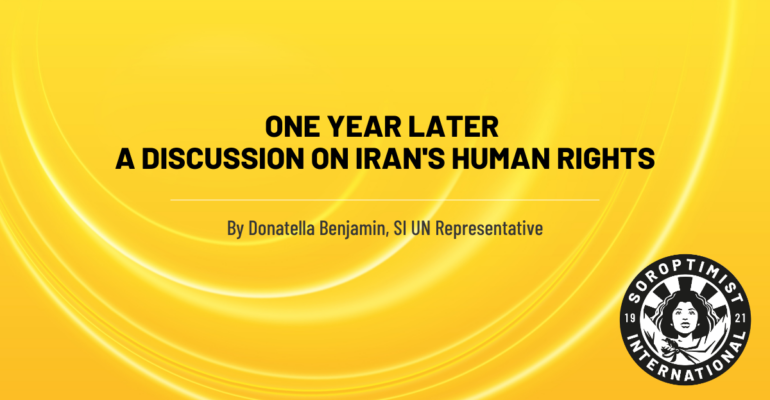Blog of Donatella Benjamin, SI UN Representative in Geneva.
During the inaugural session of the fifty-fourth regular meeting of the Human Rights Council (HRC) held in Geneva on September 11, 2023, Mr. Volker Turk, the United Nations High Commissioner for Human Rights, delivered a powerful address titled “Human rights are antidote to prevailing politics of distraction, deception, indifference and repression”. In his speech, he voiced grave apprehensions about the global state of human rights.
In the context of the Islamic Republic of Iran, Mr. Türk specifically highlighted the harsh punishments struck on women and girls who defy the mandatory dress code. These penalties include restrictions on travel and the denial of access to social services. He also drew attention to the re-establishment of the morality police, a move that has raised significant concerns. Furthermore, he underscored the lack of accountability for the death of Mahsa Amini, an issue that has been a source of considerable controversy. He also pointed out the human rights violations that have occurred during protests, particularly those involving minority communities. In addition to these issues, Mr. Türk expressed concern about the increasing use of the death penalty in Iran. This trend is particularly alarming given the broader context of human rights concerns in the country.
It is important to note that the issues raised by Mr. Türk are not isolated incidents but part of a larger pattern of human rights abuses in Iran. The compulsory dress code for women and girls, for instance, is a manifestation of the broader issue of gender inequality in the country. The re-establishment of the morality police and the lack of accountability for Mahsa Amini’s death are indicative of a system that often fails to uphold the rule of law and protect its citizens’ rights. The human rights violations during protests, especially against minority communities, and the increased use of the death penalty, are symptomatic of a repressive regime that uses fear and punishment to maintain control. These issues underscore the urgent need for international attention and action to address the human rights situation in Iran.
On October 3, Donatella Benjamin, SI UN Representative in Geneva, was invited to the HRC side event titled “One Year After Iran Uprising – A Discussion on Iran’s Human Rights”. This event was organised by Iran Human Rights Monitor and supported by organisations committed to advocating for human rights and justice, such as the Women’s Human Rights International Association (WHRIA), Fondation Danielle-Mitterrand – France Libertés, Hands off Cain, and the Italian Federation for Human Rights (FIDU).
The conversation highlighted the current state of affairs in Iran, concentrating on the changes that have occurred in the year since the Iran uprising. It also offered insights into the persistent challenges and potential opportunities for promoting human rights in Iran and mechanisms for accountability.
Mr. Tahar Boumedra, the former Director of the Human Rights office on the UN Assistance Mission for Iraq, emphasized the ongoing human rights abuses in Iran, such as forced disappearances, torture, deliberate denial of healthcare, flogging, and blinding, as reported by Amnesty International. These findings have been corroborated by the UN Special Rapporteur and other observers. Mr. Boumedra reminded the audience that Iran, under the Shah’s regime, ratified the International Covenant on Civil and Political Rights (ICCPR) and the UN Convention against Torture in 1975. These agreements are still binding, and any violations of the freedoms they guarantee, such as religion, assembly, and speech, should be considered crimes against humanity.
He also highlighted the thousands of political prisoners who have been executed extrajudicially or simply vanished, and the systematic oppression of those seeking information about the disappeared. He called for the renewal and expansion of the independent international fact-finding mission on the deteriorating human rights situation in Iran, particularly concerning women and children, which was adopted by the HRC in 2022.
Ms. Laurence Felhmann Rielle, a member of the Swiss Federal Parliament, expressed her deep concerns about the escalating violence against protesters since the killing of Mahsa Amini and the subsequent uprisings. She also drew attention to the chemical attacks on girls in over 280 schools and the new repressive law on hijab, which she equated to apartheid against women and girls.
Ms. Sonja Biserko, a former member of the UN commission of inquiry on human rights violations in North Korea, equated the thousands of extrajudicial executions that began in the 1980s to crimes against humanity and genocide. She urged the HRC to initiate an international investigation and fact-finding mission on these executions and subsequent atrocities to combat impunity.
Ms. Neda Amani, a human rights defender and president of the Young Iranians Association of Switzerland, spotlighted the structural discrimination against minorities in Iran, particularly the Baluchi and Kurds. She specifically mentioned the “Bloody Friday” incidents in Zahedan on 30 September 2022, when security forces fired on protesters and worshippers, resulting in street clashes that left at least 96 protesters dead and 300 injured.
The panel praised the courage and activism of women striving for genuine democracy in Iran. They called for accountability and an end to impunity, urging UN Member States to take more action, as mere condemnation is insufficient.

